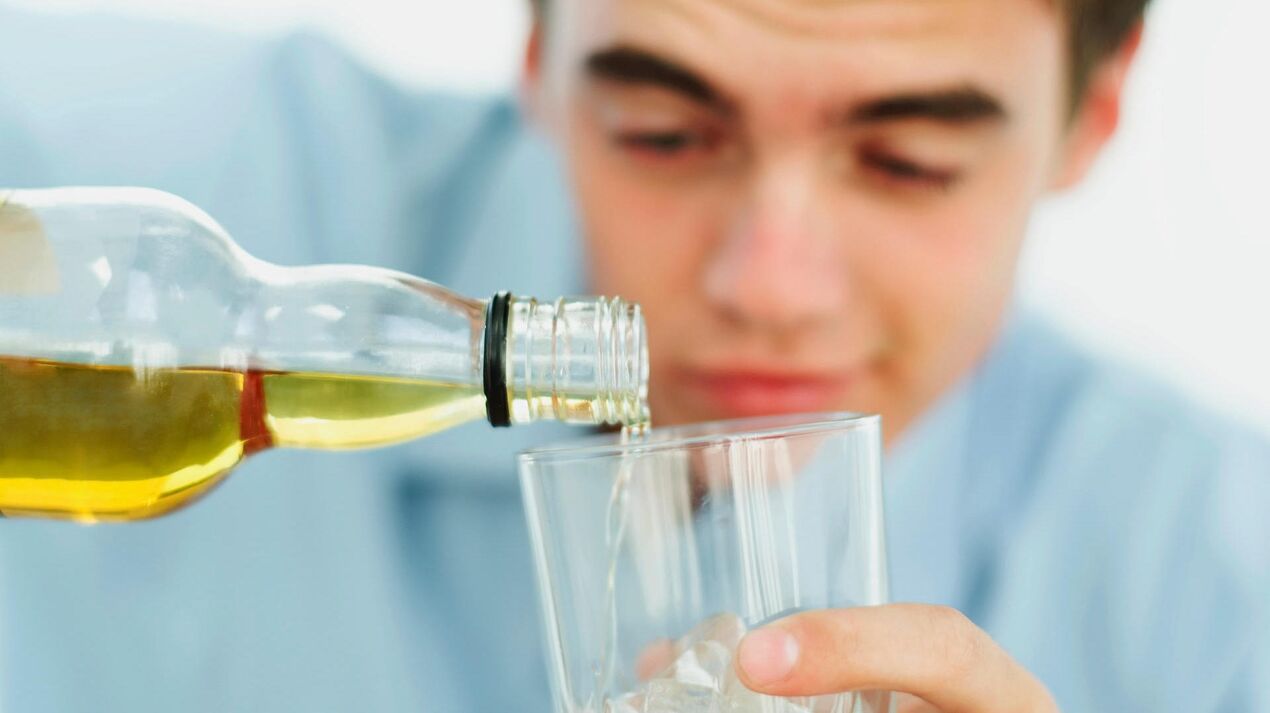
Drinking alcohol every day leads to alcoholism. The severity of complications from this serious disease depends on the dose of alcohol, its strength, quality parameters, as well as on the corresponding pathology of the patient, his weight, age and even gender. Today you will find out how dangerous alcohol is, how long patients with alcohol can live, how they suffer from the disease and then die.
When to stop?
Frequent and immeasurable drinking harms all body systems, but there is a misconception that if you drink alcohol in moderation, it will be beneficial. So, say a patient who every day justifies themselves in front of everyone. It is clear that if you consume alcohol every day in large doses, then in the near future the patient will die.
How often can you drink alcohol? Alcohol concentration of 6 ‰ is fatal to a person. It is achieved when several bottles of 500 ml of vodka are drunk in a short period of time. There will be a state of intoxication, dysfunction of the whole organism, even if the person has never been ill before. It is forbidden to consume alcoholic beverages for patients with liver, heart and vascular dysfunction.
What happens if you drink a lot of alcohol every day, do you drink alcohol often? Signs of alcohol dependence that need immediate treatment are:
- Drink every day a bottle of vodka or more, or a liter of beer.
- Gatherings continue for whatever reason with drinking buddies who drink alcohol with alcohol.
- Dysfunction of all body systems, an increase in beer stomach.
- Patients use alcohol to relax.
- Every morning, patients who consume alcohol worry about drunkenness syndrome, binges lasting for weeks.
About complications caused by vodka
Drinking vodka every day will lead to alcohol addiction. Pathological processes will arise in the body that will become irreversible:
- Kidney, hepatic, cardiovascular dysfunction will begin, and the digestive system will also suffer.
- There will be damage to the central nervous system, mental problems.
- A person's appearance will change, he will become destitute, the body will age faster.
As a result of heavy daily alcohol consumption, damage to the structure of the cerebrum will appear, which will lead to psychosis, delirium tremens.
Such patients will not realize how they will begin to forget everything quickly, become inattentive, and their intellect will decline. They will become self -reliant, socially degraded. Large doses of vodka will lead to the fact that a person will become paralyzed, peripheral nerves, spinal nerves will become inflamed, and radiculopathy will develop.
The gastric mucosa will always burn, subsequently inflamed. The inflammatory process will also occur throughout the intestinal tract. The liver will not be able to completely neutralize the toxic compounds of alcohol, its cellular structure will die, cirrhosis or oncological processes will appear.
Cardiac pathology will appear, it will diminish, dystrophy will appear in its tissues, and cardiac obesity will appear. This will lead to cardialgia, chest discomfort, tachycardia, and impaired respiratory function. The patient will become edema, his blood flow will decline, his blood pressure will increase. Violation of metabolic processes will lead to atherosclerotic changes, cerebral hemorrhage, myocardial infarction.
If you are addicted to beer every day
Unlike vodka, beer is a less potent alcoholic beverage. Therefore, it is used by many people in large quantities. There are also many complications with daily beer consumption. The abdomen will become chronically inflamed, which will manifest itself as pain and severity of the abdominal zone, and atrophy of the pancreas will occur.
This will lead to disorders of the digestive system. Excessive amounts of beer will lead to chronic liver inflammation without significant symptoms, which leads to cirrhosis over time. Since beer has a diuretic effect, the kidneys will work hard, which will cause leaching of magnesium and potassium.
Vitamin C will also be washed away, which will cause dysfunction of the heart, bones and articular structures will suffer, and the immune system will be suppressed. The person will become less resistant to stress, more aggressive, irritable or whining. Large doses of beer will lead to renal vascular sclerosis, bleeding, and renal necrosis.
There will be problems with the cardiovascular system. Patients with beer alcoholism will experience varicose veins and the heart will become obese. Shortness of breath will appear on little exercise, blood pressure will rise, heart rhythm will be disrupted, ischemia will appear. Deaths due to impaired cerebral circulation in beer alcoholism will double.
Excessive beer drinking will cause male impotence, endocrine dysfunction due to the hormone progesterone. A man becomes more like a woman, his hair falls out and does not grow, his voice changes. Such dependence on beer grows 4 times faster than vodka, and it is more difficult to respond to therapeutic measures.
The man was reluctant to admit his addiction to beer. He believes that beer is beneficial for the body, and associates impotence with other causes.
If you rarely drink, only on holidays
Alcoholic beverages have different effects on people who drink on a daily basis and those who drink on infrequent occasions. The effects of alcohol toxins on patients with alcoholism and someone who drinks in rare cases are very different. The dose of wine for the average person in the amount of 100 g is equivalent to ½ liter of vodka for alcohol -dependent patients. An alcoholic is always very sensitive to alcohol, even if he stops using it.
After three decades of quiet living, he won’t be able to drink a bit. After one glass of alcohol, the next will go, and without stopping, one can not stop. The reason is as follows. First, alcohol is oxidized in liver cells to acetaldehyde compounds, so the patient’s liver suffers the most from daily alcohol intake.
What are the effects of frequent drinking?
Here is a consideration of how beverages affect internal organs and systems with frequent use.
What will happen to the heart?
Acetaldehyde compounds are highly toxic. Daily intoxication burdens the liver, it cannot completely neutralize this toxic substance. A person with alcoholism has a rapid accumulation of alcohol metabolites, compared to a healthy person. Neutralization of these metabolites occurs slowly, they remain in the body for a long time.
Such poisoning causes intoxication syndrome, the patient is accustomed to ethanol. The change in such a person will always be, the more he drinks alcohol, the worse his general condition.
The large accumulation of acetaldehyde compounds in the body of alcoholics will persist for a long time compared to non -drinkers. Acetaldehyde is deposited not only in liver tissue, but also in other organs.
This will lead to a constant desire to consume alcohol from ethanol -dependent patients. Ordinary people do not have this desire. If you continue to drink a lot of alcohol, then there will be hepatic cirrhosis. Organs become diminished, ducts shrink in the liver, and pressure increases, blood stasis occurs. This leads to the fact that the walls of the organ will rupture, bleeding will occur, which will lead to death.
Non -alcoholic people are drunk in rare cases, they also rarely feel drunk syndrome, because their liver is functioning normally, it neutralizes alcohol toxins well.
How is brain structure affected?
When a person is intoxicated, the cortical layer is destroyed, numbness and death of individual segments of the brain. In alcoholism, edema, ulcers with scarring, and dilated ducts are observed in brain tissue. Numerous ruptures are also shown, cysts forming on necrotic segments.
Effects of ethanol on the central nervous system
If you drink a lot of alcohol, then a person behaves differently, he is mentally and morally degraded. The patient feels that reality is inadequate, his attention is less focused. Also, nerve tissue conducts fewer impulses, polyneuritis is formed, movements are not well coordinated, the patient does not sleep well, he is irrational, aggressive, he has a fever.
He is delusional, he is disturbed by a state of hallucinations, the person does not feel the temperature, pain, hyperhidrosis is expressed. The pain often arises suddenly, one feels that ants are crawling on his skin, and muscle spasms are also disturbed. Absent treatment will lead to changes in encephalopathy, alcoholism, mental retardation, Korsakov psychosis, and epileptic seizures.
Heart and blood vessels
Systematic consumption of alcohol will cause cardiac hypertrophy, its work will be disrupted, the rhythm will fail, ischemic, atherosclerotic processes, hypertension with myocardial infarction will occur.
What will happen to the kidneys?
If you drink vodka every day, the kidneys will wear out faster, and they will also lose work capacity quickly. Metabolic processes are disrupted, the blood will not be cleaned of toxic compounds, which will cause poisoning. There is a high probability of the formation of pyelonephritic changes, inflammatory processes of the urinary system. Then there will be kidney failure, stones and oncology will appear.
How is the gastrointestinal tract affected by the spleen?
Ethanol compounds are toxic to the digestive system. They will hit the wall of the esophagus, heartburn will occur, the desire to vomit will increase, which will lead to the fact that the esophageal canal begins to thin and expand. This will break the walls of the veins, bleeding will appear.
The gastric membrane will also suffer, it will age faster, inflammatory, ulcerative, and oncological processes will form. Spleen dysfunction will occur, which uses up destroyed blood cells. The spleen will be large, there will be suppuration, necrosis.
Immune system problems
Immunity will become depressed, which will weaken the body’s defenses. The synthesis of lysozyme proteins contained in saliva and tears is reduced, which causes pathogenic microorganisms to be neutralized. A person will become prone to many infectious pathologies, his condition will worsen.
What will happen to the muscles and joints?
If you consume alcohol systematically, then there will be calcium leaching, bone tissue will become brittle, it will often be damaged, and osteoporotic changes will appear. The joints will also start to ache. 75% of alcoholics suffer from arthritis, the subsequent feast only increases the pain. There are also significant negative effects on the muscles. Muscle growth slows down or stops, muscle tissue will be destroyed. Flabbiness, atrophy will appear in it, but there will be more fat.
Fluid will be expelled from the body slowly, edema changes will occur. Uric acid will accumulate in the form of hydrochloric acid, and will begin to accumulate in the joints. This will lead to their inflammation, gout will appear. The more patients drink, the more painful sensations will manifest. Excess fluid that penetrates into the joint bag puts pressure on the walls of the cavity, and the nerve tissue becomes irritated. After a period of time, the joint becomes deformed.
Damage to the endocrine system
Alcoholism leads to endocrine dysfunction. In the female body, testosterone synthesis will increase, and estrogen and progesterone levels will decrease. Also, the ovaries will become painful, excess weight will be gained.

A woman’s appearance will change according to behavior, sleep will be disturbed, she will become aggressive, her muscle mass will increase, and her hairline will become more noticeable.
How are the respiratory organs affected?
About 2% of alcohol is excreted in the form of vapor through lung tissue. This leads to damage to the respiratory mucosa, the inflammatory process of the pharynx, larynx, bronchi, and lungs develops. Pneumonia can be complicated by pneumosclerosis. Ethanol in the bloodstream expands lung tissue, and emphysema develops.
What will happen to the vision?
As a result of ethanol exposure, the type of intracranial pressure will increase, which is the cause of minor bleeding, and the eye canal will be damaged. The hypoxic process of overly tense eye muscles will occur, and visual function will decline. There is a gradual atrophy of the eye muscles, the optic nerve is functioning inadequately, the patient may become completely blind.
About appearance
Alcohol spoils a person's appearance:
- There is swelling under the eyeballs.
- The hair is tangled.
- The nose has a bluish color.
- Swollen face, bleeding from the blow was observed.
- Clothes torn, dirty, smelly.
Increased blood flow to the tissue structure burdens the vessels, they are damaged. Small capillaries rupture. Red dots can be observed on the face. The blue color of the skin appears as a result of vascular damage, hypoxia. To produce ethanol, the body needs a lot of fluids, which is indicated by thirst in alcohol. After he drank the water, it accumulated.
This is how the body responds to the possibility of dehydration. As a result, there is swelling in the face area, on the limbs.
Life expectancy for alcohol addiction
It is difficult to state the life expectancy of such patients. After all, every organism is an individual. The life expectancy of such a person is influenced by various conditions, for example, dosage, quality of alcohol.
According to statistics, the duration of patients with alcoholism ranges from 48 to 55 years. With drunken alcoholism, consumption of alcoholic beverages in youth, such people will die earlier. Patients with the last stage of alcoholism are at high risk. They live no more than 6 years from the onset of the disease, death occurs due to severe pathology.
Alcohol drinkers often die:
- from oncology, perforated gastric ulcer or duodenal ulcer;
- hepatitis, cirrhosis, fibrotic changes in the liver caused by alcohol;
- intestinal obstruction;
- acute circulatory disorders of the brain caused by ischemia or bleeding;
- myocardiopathic changes, myocardial infarction, sudden coronary death;
- acute or chronic inflammation of the pancreas;
- sudden death during sleep;
- committed suicide in a drunken state.

Poisoning with ethanol compounds can cause death in people between the ages of 35 and 45 years. All internal organs and systems will fail, and one’s life will be shortened rapidly. In order not to suffer from severe addiction, it is better to abstain from alcoholic beverages altogether, then a person will avoid many problems and preserve his health.
























